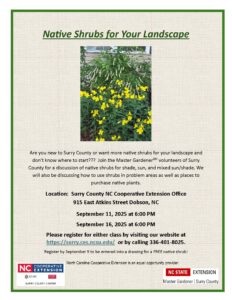
Shrubs for Your Landscape Workshop
Are you new to Surry County or want more native shrubs for your landscape and don’t know where to …



El inglés es el idioma de control de esta página. En la medida en que haya algún conflicto entre la traducción al inglés y la traducción, el inglés prevalece.
Al hacer clic en el enlace de traducción se activa un servicio de traducción gratuito para convertir la página al español. Al igual que con cualquier traducción por Internet, la conversión no es sensible al contexto y puede que no traduzca el texto en su significado original. NC State Extension no garantiza la exactitud del texto traducido. Por favor, tenga en cuenta que algunas aplicaciones y/o servicios pueden no funcionar como se espera cuando se traducen.
Inglês é o idioma de controle desta página. Na medida que haja algum conflito entre o texto original em Inglês e a tradução, o Inglês prevalece.
Ao clicar no link de tradução, um serviço gratuito de tradução será ativado para converter a página para o Português. Como em qualquer tradução pela internet, a conversão não é sensivel ao contexto e pode não ocorrer a tradução para o significado orginal. O serviço de Extensão da Carolina do Norte (NC State Extension) não garante a exatidão do texto traduzido. Por favor, observe que algumas funções ou serviços podem não funcionar como esperado após a tradução.
English is the controlling language of this page. To the extent there is any conflict between the English text and the translation, English controls.
Clicking on the translation link activates a free translation service to convert the page to Spanish. As with any Internet translation, the conversion is not context-sensitive and may not translate the text to its original meaning. NC State Extension does not guarantee the accuracy of the translated text. Please note that some applications and/or services may not function as expected when translated.
Collapse ▲
Are you new to Surry County or want more native shrubs for your landscape and don’t know where to …
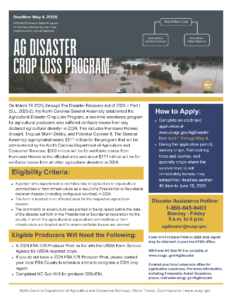
On March 19 2025, through The Disaster Recovery Act of 2025 – Part I (S.L. 2025-2), the North Carolina General …
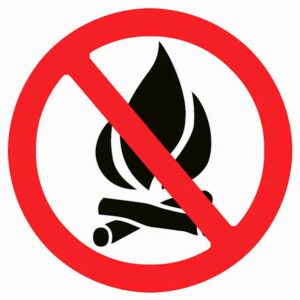
FOR IMMEDIATE RELEASE Burn ban issued for all North Carolina counties due to hazardous forest fire conditions THURSDAY, MARCH 20, 2025 CONTACT: Philip …
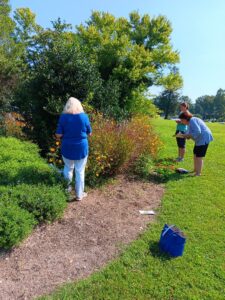
Great Southeast Pollinator Census Friday, August 23rd During Mt Airy Farmer’s Market Hours: 9:00 a.m. – 1:00 p.m. Interested in learning more …
Statement from Agriculture Commissioner Steve Troxler on waiving of motor vehicle regulations to help farms Monday, August 5, 2024 RALEIGH – …
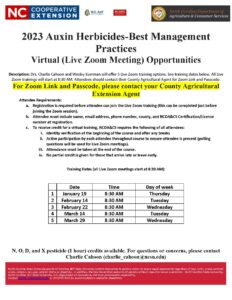
North Carolina Cooperative Extension plans to continue the Auxin Herbicides Best Management Practices in 2023. This year in addition …
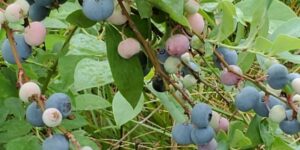
Are you interested in knowing how to prune blueberries? Join us in Rockingham County on February 17 for a …
The eighth annual Foothills Specialty Crop Growers’ Roundtable is scheduled for Friday, February 4, 2022 from 12:30 – 5:15 …

Due to forecasted weather conditions for Friday, January 21, 2022, the “GRAPEVINE PRUNING WORKSHOP” has been postponed and rescheduled …
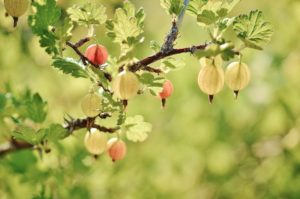
9/16/2020 – (Reviewed 8/28/2024) The short answer is “no.” You cannot legally grow currants or gooseberries in North Carolina. …
This publication, targeted to vegetable growers in North Carolina, Virginia, and other states in the …
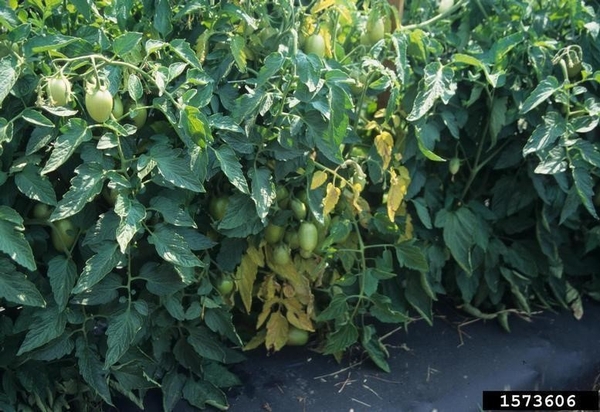
Tomato pith necrosis, first observed on tomato plants in 1978, continues to be a threat …

This factsheet discusses symptoms and control of several leaf diseases common in North Carolina blueberry …
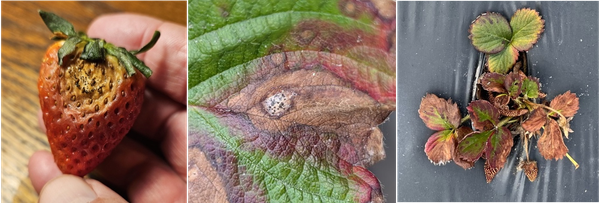
NC State conducted a strawberry Neopestalotiopsis (Neo-P) trial at the Horticultural Crops Research Station in …
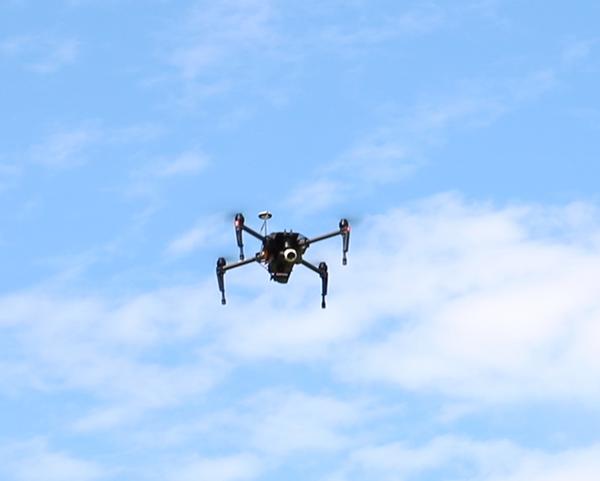
This publication discusses flying unmanned aerial vehicles (drones, model aircraft) for commercial purposes. You'll learn …

This publication reviews research between the late 2000s and the 2020s to explore trends shaped …
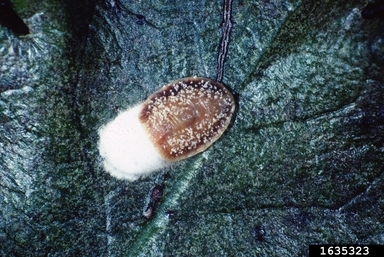
This article will cover two important scale insect pests of blueberries in North Carolina, terrapin …
Much success in growing tomatoes can be attributed to use of a few proven techniques. …